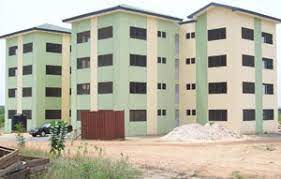Urban communities require comprehensive response on housing to thrive
“A good look at the development outcomes in our communities tells the level of our commitment towards the performance of the spatial planning and development management functions of the Assemblies.
Mrs Mary Awelana Addah, Executive Director, Ghana Integrity Initiative, says the current land and housing situation calls for an urgent and comprehensive response to ensure that urban centres can thrive.
She said the scarcity of resources, such as land and housing, can breed opportunities for extortion and unethical practices.
Mrs Addah said this at the opening of the orientation workshop to build the capacities of Spatial Planning Committee (SPC) and Technical Sub Committee (TSC) members of some selected MMDAs in the Greater Accra Region, organized by the GII, the national chapter of Transparency International (TI) in collaboration with the Land Use and Spatial Planning Authority (LUSPA).
“By building the capacity of SPC’s and TSC’s, we aim to promote openness, accountability, and ethical standards. We hope to create an environment where transparency and responsibility flourish, ultimately leading to effective and efficient land use and spatial planning.”
She noted that throughout the workshop, they would delve into the intricacies of the Land Use and Spatial Planning Act 2016 (Act 924) and LI 2384 and explore the roles and responsibilities of SPC’s and TSC’s and discuss the significance and scope of land use and spatial planning services.
“We aim to foster an environment where transparency and accountability in spatial planning and management practices are not just encouraged but ingrained in the very fabric of our urban centres.”
She said a sound land administration and spatial planning was important because it formed the cornerstones of sustainable urban development, provided the framework for the provision of public services, equitable access to infrastructure, and the creation of liveable cities.
“It is crucial to recognize that urban planning environments today are particularly susceptible to corruption and illegitimate gain.”
Mr Addah said according to Transparency International, by 2050, an overwhelming majority of the world’s population would reside in urban areas, adding that urbanization was a force of change, a catalyst for economic growth and societal development.
She noted that urbanization was a double-edged sword, which when marred by corruption and mismanagement, could be a crippling force that stifled progress and exacerbated inequalities.
“While we acknowledge the challenges ahead, we must also recognize that these challenges are interconnected and must be addressed with a multi-pronged approach. It is not enough to simply focus on land administration or spatial planning in isolation. Rather, we must tackle these issues alongside other societal challenges, from poverty to pollution to crime.” \
She added that “the road to sustainable development is fraught with challenges, but it is a path we must tread for the betterment of our cities, our nation, and our future generations.
Mrs Lilian Baeka, Chief Director Greater Accra Regional Coordinating Council, said the workshop was to equip members of the SPC and TSC with knowledge on the critical functions of the District Assemblies on land use and spatial planning practices in accordance the Act 925 and the L.I. 2384.
She said Land Use and Spatial Planning Authority in its present position as a regulatory body was desirous of supporting MMDAs to effectively and efficiently conduct their spatial planning and human settlement management functions, in compliance to the provisions of the spatial laws.
‘
“A good look at the development outcomes in our communities tells the level of our commitment towards the performance of the spatial planning and development management functions of the Assemblies.
Mr Baeka said in many of the Assemblies the permitting function only means revenue mobilisation, thereby setting aside all the other aspects that should motivate a good investment into creating an effective and efficient spatial planning and permitting system.
“Most Assemblies barely fund the preparation of local plans to guide developments, are reluctant to fund Spatial Planning Committee Meetings, issue permits without recourse to the Spatial Planning Committees, nor make available the necessary logistical support to facilitate development control efforts.”
She commended the GII for the workshop sating it would go a long way to create the enabling environment for the effective performance of spatial planning.


